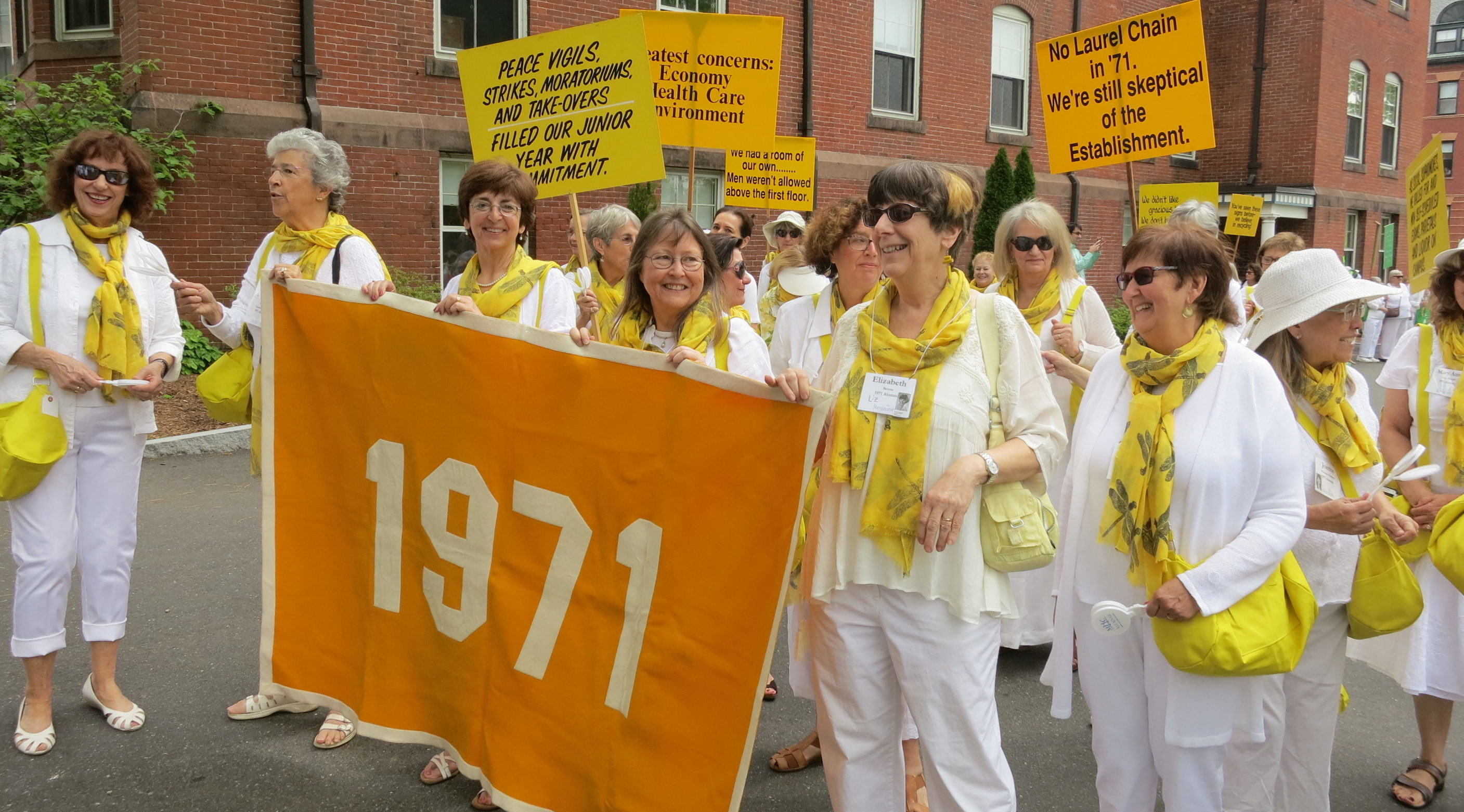
45th Parade
50th Reunion Class History of the Class of 1971
Submitted by Liz Berens
When we arrived on campus:
• Thurgood Marshall had just become the first Black Supreme Court Justice, while that same court struck down the ban on interracial marriage. Haight Ashbury epitomized the era of “free love,” and the British Parliament had decriminalized homosexuality. As we settled into the rhythm of college life, the musical “Hair” premiered off-Broadway just days before John McCain became a prisoner of war in Vietnam.
• At convocation President Richard Gettell referred to us as “…uncommon women in this age of the common man…”
• We were the first class to NOT have a five-course load or Saturday classes.
• The Four College Consortium allowed us to take courses at Smith, UMass and Amherst. Hampshire College would open before we graduated, making it a group of five.
• When we arrived, all of the Seven Sisters, five of the Ivy League schools as well as many other elite colleges, were single sex.
• There were many rules and much oversight of our lives: freshmen had limited overnights with parental permission necessary, men were not allowed above the first floor, in most dorms there was but one pay phone per floor for off-campus calls, and there were no locks on the doors of our rooms.
• Gracious living twice a week still existed, but the mandatory skirts were often topped by sweatshirts adhering to the letter of the law if not the spirit.
During our time on campus we experienced these historical international and domestic events:
• Dr. Neil Barnard performed the first successful human heart transplant, and Golda Meir was elected the first female prime minister of Israel. Martin Luther King, Jr. and Robert Kennedy were assassinated. Neil Armstrong was the first person to walk on the moon, and the original Woodstock music festival occurred in Upstate NY. A massive oil spill occurred off the Santa Barbara coast while the first African American woman, Shirley Chisholm (who later taught at Mount Holyoke) was elected to Congress. “Sesame Street” debuted, as did Earth Day and Garry Trudeau’s comic strip “Doonesbury.” The first Vietnam draft lottery determined who among our friends and family would be in jeopardy of being conscripted. The Environmental Protection Agency (EPA) was established, and the Occupational Safety and Health Act (OSHA) was signed into law. Widespread anti-Vietnam War protests were common, with four students killed and nine more wounded by National Guardsmen at Kent State as they protested the U.S. invasion of Cambodia. The Pentagon Papers were leaked to the New York Times and published.
• We tested the waters of co-education, visiting various men’s colleges for a week, a semester or a year. Some of us transferred to these schools, although many of us determined that we wanted to graduate from Mount Holyoke despite having choices that did not exist when we applied for admission.
How we spent our free time while we were on campus:
• We spent hours playing bridge, sunning on Skinner Green or hanging out at Glessies, the CI and the Odyssey Bookshop.
• Judy Collins, Livingston Taylor, W.H. Auden, William Ruckelshaus and Mark Rudd visited campus greeted by various levels of enthusiasm.
• Some of us were politically active; many were not.
By the time we graduated:
• House mothers had been replaced by faculty members or resident fellows in some dorms. Gracious living was gone, as were the smokers. (Students were allowed to smoke in their rooms.)
• We had self-scheduled exams.
• The College had taken its first steps toward greater diversity, hiring faculty of color, creating a Black studies major, and approving housing for a Black Culture Center.
• And the College was wrestling with the option of co-education. 50 years later it has become very clear to me that the College made the correct decision.
Read all of the Reunion 2021 class histories at https://alumnae.mtholyoke.edu/…/reunion-2021-class…/